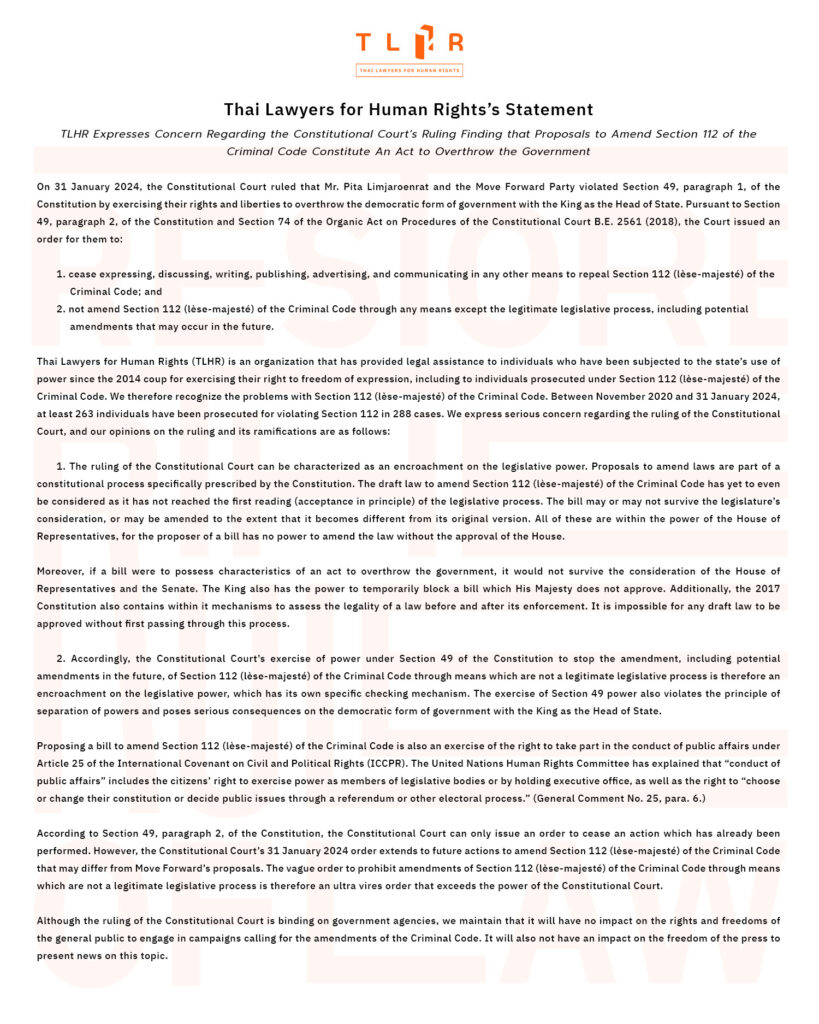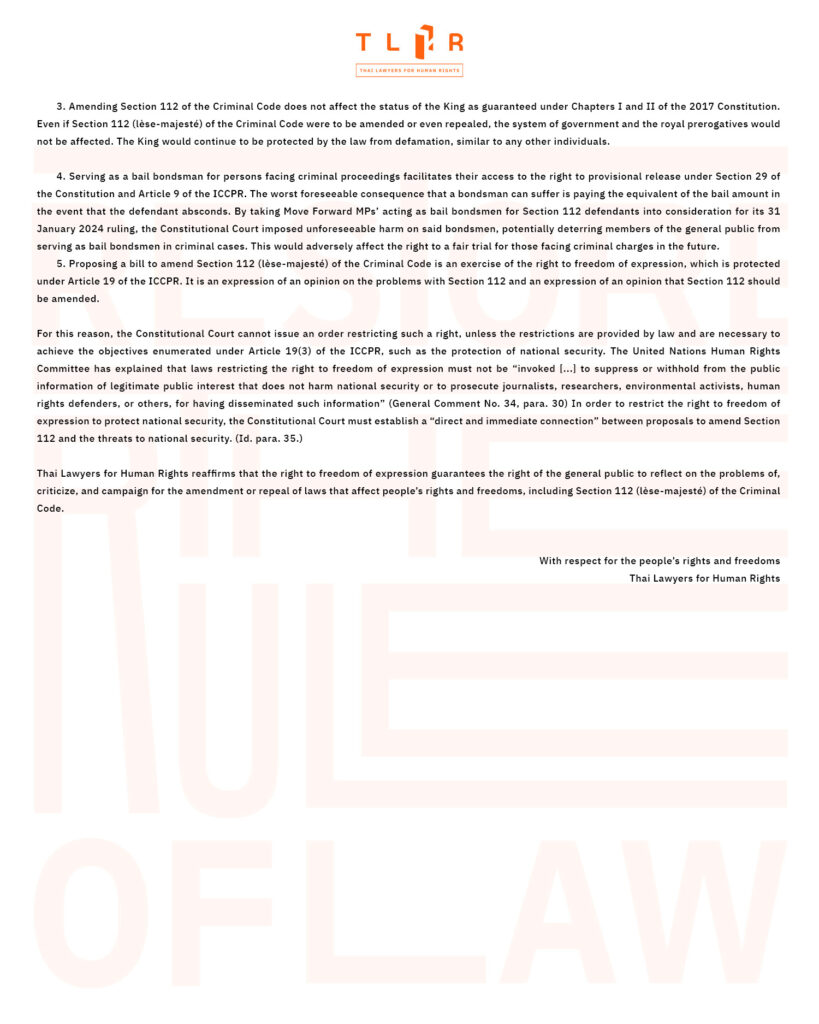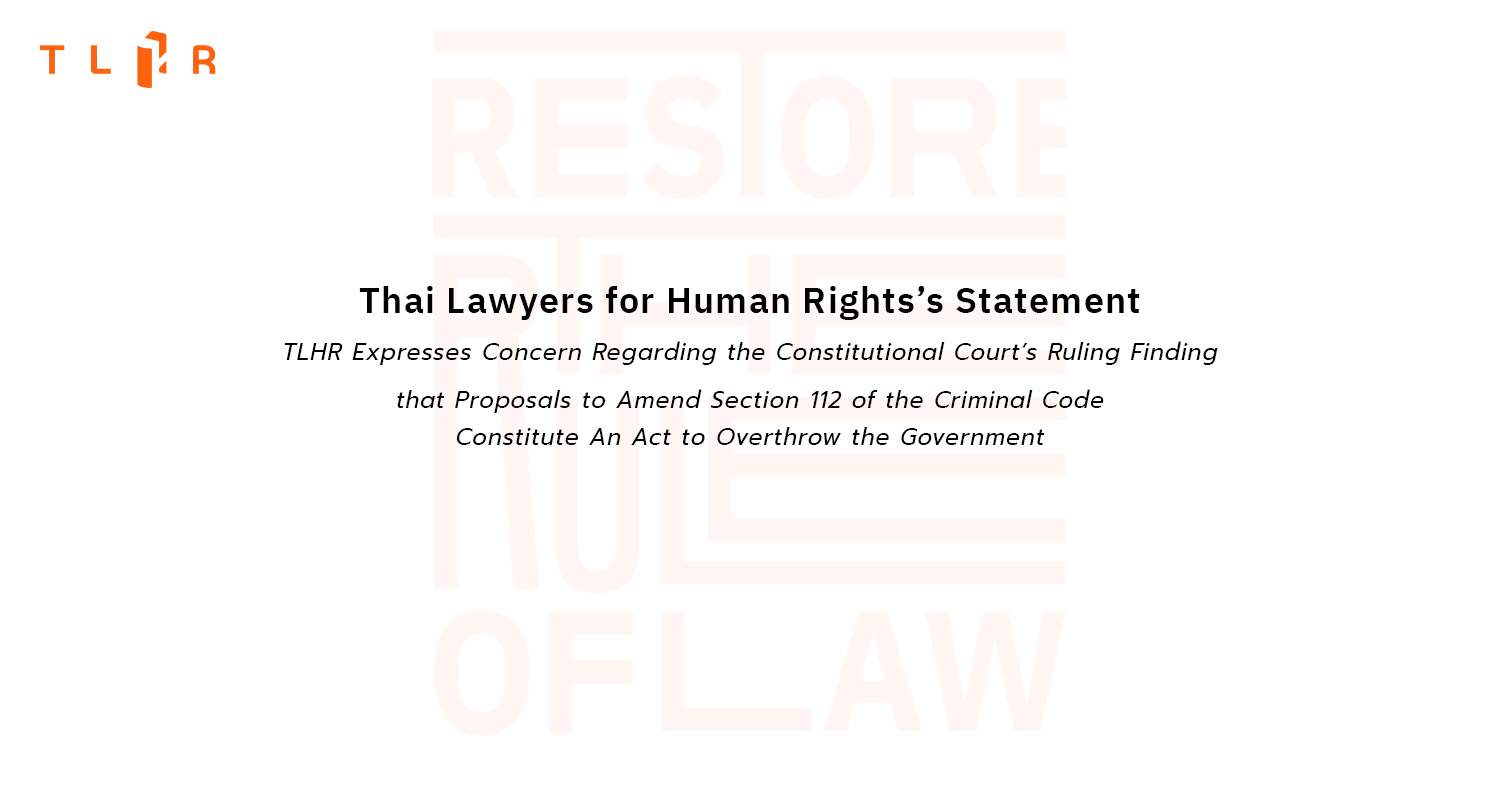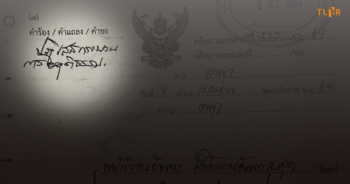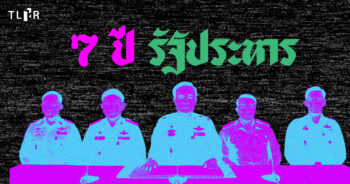Thai Lawyers for Human Rights’s Statement
TLHR Expresses Concern Regarding the Constitutional Court’s Ruling Finding that Proposals to Amend Section 112 of the Criminal Code Constitute An Act to Overthrow the Government
On 31 January 2024, the Constitutional Court ruled that Mr. Pita Limjaroenrat and the Move Forward Party violated Section 49, paragraph 1, of the Constitution by exercising their rights and liberties to overthrow the democratic form of government with the King as the Head of State. Pursuant to Section 49, paragraph 2, of the Constitution and Section 74 of the Organic Act on Procedures of the Constitutional Court B.E. 2561 (2018), the Court issued an order for them to:
- cease expressing, discussing, writing, publishing, advertising, and communicating in any other means to repeal Section 112 (lèse-majesté) of the Criminal Code; and
- not amend Section 112 (lèse-majesté) of the Criminal Code through any means except the legitimate legislative process, including potential amendments that may occur in the future.
Thai Lawyers for Human Rights (TLHR) is an organization that has provided legal assistance to individuals who have been subjected to the state’s use of power since the 2014 coup for exercising their right to freedom of expression, including to individuals prosecuted under Section 112 (lèse-majesté) of the Criminal Code. We therefore recognize the problems with Section 112 (lèse-majesté) of the Criminal Code. Between November 2020 and 31 January 2024, at least 263 individuals have been prosecuted for violating Section 112 in 288 cases. We express serious concern regarding the ruling of the Constitutional Court, and our opinions on the ruling and its ramifications are as follows:
- The ruling of the Constitutional Court can be characterized as an encroachment on the legislative power. Proposals to amend laws are part of a constitutional process specifically prescribed by the Constitution. The draft law to amend Section 112 (lèse-majesté) of the Criminal Code has yet to even be considered as it has not reached the first reading (acceptance in principle) of the legislative process. The bill may or may not survive the legislature’s consideration, or may be amended to the extent that it becomes different from its original version. All of these are within the power of the House of Representatives, for the proposer of a bill has no power to amend the law without the approval of the House.
Moreover, if a bill were to possess characteristics of an act to overthrow the government, it would not survive the consideration of the House of Representatives and the Senate. The King also has the power to temporarily block a bill which His Majesty does not approve. Additionally, the 2017 Constitution also contains within it mechanisms to assess the legality of a law before and after its enforcement. It is impossible for any draft law to be approved without first passing through this process.
Accordingly, the Constitutional Court’s exercise of power under Section 49 of the Constitution to stop the amendment, including potential amendments in the future, of Section 112 (lèse-majesté) of the Criminal Code through means which are not a legitimate legislative process is therefore an encroachment on the legislative power, which has its own specific checking mechanism. The exercise of Section 49 power also violates the principle of separation of powers and poses serious consequences on the democratic form of government with the King as the Head of State.
Proposing a bill to amend Section 112 (lèse-majesté) of the Criminal Code is also an exercise of the right to take part in the conduct of public affairs under Article 25 of the International Covenant on Civil and Political Rights (ICCPR). The United Nations Human Rights Committee has explained that “conduct of public affairs” includes the citizens’ right to exercise power as members of legislative bodies or by holding executive office, as well as the right to “choose or change their constitution or decide public issues through a referendum or other electoral process.” (General Comment No. 25, para. 6.)
- According to Section 49, paragraph 2, of the Constitution, the Constitutional Court can only issue an order to cease an action which has already been performed. However, the Constitutional Court’s 31 January 2024 order extends to future actions to amend Section 112 (lèse-majesté) of the Criminal Code that may differ from Move Forward’s proposals. The vague order to prohibit amendments of Section 112 (lèse-majesté) of the Criminal Code through means which are not a legitimate legislative process is therefore an ultra vires order that exceeds the power of the Constitutional Court.
Although the ruling of the Constitutional Court is binding on government agencies, we maintain that it will have no impact on the rights and freedoms of the general public to engage in campaigns calling for the amendments of the Criminal Code. It will also not have an impact on the freedom of the press to present news on this topic.
- Amending Section 112 of the Criminal Code does not affect the status of the King as guaranteed under Chapters I and II of the 2017 Constitution. Even if Section 112 (lèse-majesté) of the Criminal Code were to be amended or even repealed, the system of government and the royal prerogatives would not be affected. The King would continue to be protected by the law from defamation, similar to any other individuals.
- Serving as a bail bondsman for persons facing criminal proceedings facilitates their access to the right to provisional release under Section 29 of the Constitution and Article 9 of the ICCPR. The worst foreseeable consequence that a bondsman can suffer is paying the equivalent of the bail amount in the event that the defendant absconds. By taking Move Forward MPs’ acting as bail bondsmen for Section 112 defendants into consideration for its 31 January 2024 ruling, the Constitutional Court imposed unforeseeable harm on said bondsmen, potentially deterring members of the general public from serving as bail bondsmen in criminal cases. This would adversely affect the right to a fair trial for those facing criminal charges in the future.
- Proposing a bill to amend Section 112 (lèse-majesté) of the Criminal Code is an exercise of the right to freedom of expression, which is protected under Article 19 of the ICCPR. It is an expression of an opinion on the problems with Section 112 and an expression of an opinion that Section 112 should be amended.
For this reason, the Constitutional Court cannot issue an order restricting such a right, unless the restrictions are provided by law and are necessary to achieve the objectives enumerated under Article 19(3) of the ICCPR, such as the protection of national security. The United Nations Human Rights Committee has explained that laws restricting the right to freedom of expression must not be “invoked […] to suppress or withhold from the public information of legitimate public interest that does not harm national security or to prosecute journalists, researchers, environmental activists, human rights defenders, or others, for having disseminated such information” (General Comment No. 34, para. 30) In order to restrict the right to freedom of expression to protect national security, the Constitutional Court must establish a “direct and immediate connection” between proposals to amend Section 112 and the threats to national security. (Id. para. 35.)
Thai Lawyers for Human Rights reaffirms that the right to freedom of expression guarantees the right of the general public to reflect on the problems of, criticize, and campaign for the amendment or repeal of laws that affect people’s rights and freedoms, including Section 112 (lèse-majesté) of the Criminal Code.
With respect for the people’s rights and freedoms
Thai Lawyers for Human Rights
